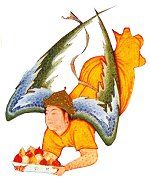Sufism and Vegetarianism
| Although the majority of Muslims are meat eaters, there is also widespread remembrance of Muhammad's warning, "Do not allow your stomachs to become graveyards!" For this reason, meat is used in moderation in many traditional recipes. Many Sufi tariqats prohibit meat-eating during retreats. The Qadiri shaikh Abdul Karim Jili, commenting on Ibn Arabi's advice to avoid animal fat during retreats, stated that "animal fat strengthens animality, and its principles will dominate the spiritual principles." |  |
 | The Chishti Inayat Khan, who introduced Sufi principles to Europe and America in the early part of this century, expressed similar concerns. He observed that vegetarianism promotes compassion and harmlessness to living creatures, and that a vegetarian diet aids in the purification of the body, the opening of the channels of breath and refinement of spiritual faculties. He also taught that meat can be a medicine, and can help some people to withstand the struggle of life in the material world. Therefore, each spiritual seeker should be guided by a teacher in the choice of diet, a decision also inevitably influenced by the regional climate and food supply. |
from Serving the Guest: A Sufi Cookbook
Copyright © 1999, 2000
Kathleen Seidel All Rights Reserved
Permission is explicitly granted for educational and non-profit purposes. Please use the credit: Serving the Guest. Copyright 1999, 2000 Kathleen Seidel. Copyright information for previously published material by other authors used by permission, and print sources for images, may be found at http://www.superluminal.com/cookbook.
Copyright © 1999, 2000
Kathleen Seidel All Rights Reserved
Permission is explicitly granted for educational and non-profit purposes. Please use the credit: Serving the Guest. Copyright 1999, 2000 Kathleen Seidel. Copyright information for previously published material by other authors used by permission, and print sources for images, may be found at http://www.superluminal.com/cookbook.

沒有留言:
張貼留言